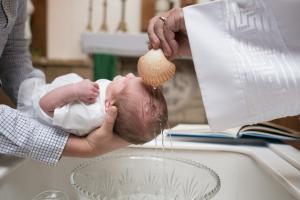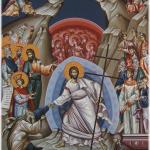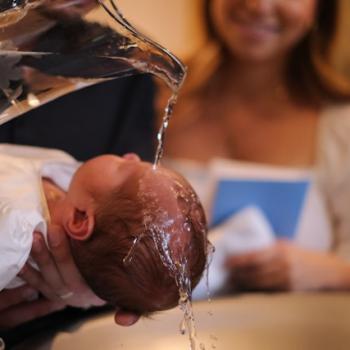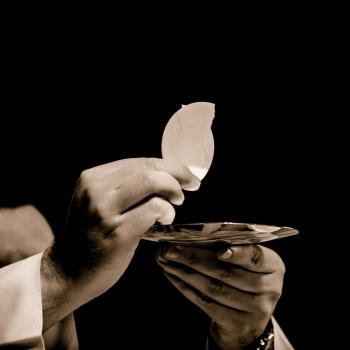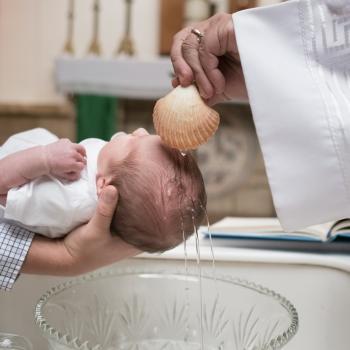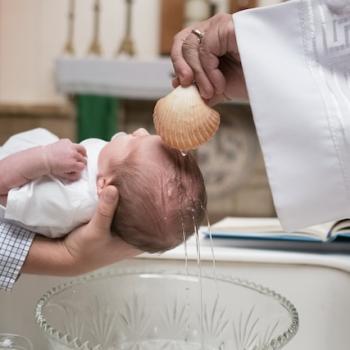Photo by Josh Applegate on Unsplash
“We acknowledge one baptism for the forgiveness of sins.” (Nicene Creed)
When I was still a Methodist, I served a small church in rural, northeastern Ohio. One of my colleagues was a pastor who served a nearby church and appealing to the practice of the Methodist church she had an adult, male parishioner who asked to be immersed. She found a place to do that but as the day for the baptism drew close, she got increasingly nervous about getting this much larger man back up out of the water. Failing to take water buoyancy into account, her anxiety got the best of her and, when she finally lowered him into the baptismal, she shouted out, “Drink ye all of this!”
Baptism may be the most hotly debated and most widely misunderstood sacrament of the church. And it will be all but impossible to address the issues that arise out of its practice. But the time we are finished, I hope that you will appreciate just how important it is.
Let’s get the least important issue out of the way first: sprinkle, dunk or dry clean? There are two things that are essential to any of the sacraments: a physical sign and a spiritual reality. The church insists on both of these because creation is God’s gift and because that good gift needs to be tied to the transformative work of God’s grace. The link between the two is the liturgy of the church, the prayers that God gives us to pray – that invite God to use water, wine, and bread to save and heal us.
Practically speaking just how much water is involved really matters very little. Yes, there are examples in the New Testament of people being immersed, but if you have ever seen the Jordan River, you know that it isn’t all that deep in most places. So, the Anglican, Catholic, and Orthodox traditions allow for both and – depending on the priest – you may get quite a lot of water, even from a font. In fact, I have seen Orthodox priests plunge babies completely under water for half second. But baptism isn’t a magic act, so if you get something closer to dry cleaning in some churches that doesn’t mean you haven’t been baptized.
A much more contentious issue revolves around the question of when you ought to be baptized. Some of our sisters and brothers in the faith argue that adult baptism is the only option. They argue that you need to know what you are doing and only adults (whatever that might mean) can make that decision.
The difficulty with that position is that the early church didn’t confine itself to adult baptism. Yes, there are examples of adult baptism and that is understandable. As a new message about the work of God in the world, the Gospel was necessarily addressed to people who were old enough to understand it.
But in many cases, the oldest male in the household converted to Christianity and then everyone who lived with him – women, children (including infants), and even slaves – were baptized right along with him. That was partly because of the customs of the day, of course, but it was also because baptism is not just an individual experience but a communal experience. It was initiation into God’s covenant with us in Christ.
Baptism, then, plays the same the role in the Christian faith that circumcision played in the ancient Jewish faith. And just as the families and tribes of ancient Israel were initiated into God’s covenant, so we are initiated through baptism into the body of Christ. And in this communal act parents, supported by godparents and the larger congregation, bring their children with them into that covenant when they have their infant children baptized. Just how important the communal and covenantal nature of baptism is clear from the early art of the church. One image portrays people being baptized, surrounded by the twelve apostles and baptizands are portrayed as Adam and Eve, stressing the renewal of all humanity.
An equally contentious question is: Are we saved by faith or by baptism?
On the one hand, the answer is, we aren’t saved by either one. We are saved by God. It is only because God responds to our faith and only because God is at work in the sacrament of baptism that either one makes any difference at all. We don’t possess the power to heal ourselves and baptism is not a magic trick.
That said, Paul described faith and baptism as the starting point of the Christian journey because in his mind the two are not separate things. Paul could not imagine a person having faith in Christ who would not want to be baptized. And he couldn’t imagine anyone but a complete fraud wanting to be baptized without trusting Christ.
So where does baptism fit into our understanding of the spiritual journey? It is the first step on the journey into Christ. Baptism is a watershed, a turning point, a revolution – in our lives and in the life of God’s church.
But when we celebrate a baptism we also declare that in Christ the world faces a fundamental choice: We can seek God’s forgiveness and receive his grace or we can plunge head forward into judgment. The one path leads to healing and restoration. The other is marked by chaos and darkness, much of it of our own making.
Baptism, then, is a word and sign of hope spoken into our lives and into the darkness of our world. But it is also a crisis, a turning point, and a call to discernment. We can either face the brokenness and darkness of our own lives and the world – and turn from it – or we can embrace the darkness and let it destroy us.
Just because baptism involves babies, water, and families doesn’t mean that it is a harmless ceremony. And if you think it is, you completely miss the point. It is the instrument of God’s invading grace and judgment on the darkness of the world and our own souls.
For that reason baptism is also never removed from the realities of our lives. It doesn’t confine itself to glittering generalities. Of course, the liturgy speaks of turning from the works of Satan, renouncing evil, and turning toward Christ. That is the only language that a timeless rehearsal of God’s work in our lives can use.
But every generation is obligated to face its own sin and shoulder its own cross. And that is why this ancient creed and its affirmation of baptism speaks to the events of this last week, the shooting at the Covenant School in Nashville, and the darkness that led to an unspeakable act of brutality.
Let me suggest a few ways in which baptism does that:
First: The sacrament of baptism should save us from naïvete.
I understand that we all mean a variety of things when we say that we are shocked, that this kind of thing shouldn’t happen in a civilized country, or that we obviously haven’t passed the right laws or this wouldn’t happen. But the baptismal rite reminds us that this is nonsense.
We are called on to renounce Satan and all the spiritual forces of wickedness that rebel against God; to renounce the evil powers of this world which corrupt and destroy the creatures of God; and to renounce all sinful desires that draw us from the love of God.
We do this because the world is a broken place. It is worthy of our love because God made it. It is worthy of care because it is filled with people made in the image of God. And it is worthy of gratitude because it is the good gift of God. But it is broken, nonetheless. And the baptized understand this.
Second: Because the baptized know that the world is enthralled to evil, unflinching realism about the human condition shapes our worldview.
That realism should lend urgency to our mission and courage when it is needed. It common in some circles to assume that the teaching of Jesus was marked by urgency because he believed the end of the world was imminent. But the moment we are confronted by the truth about the state of our souls and the condition of our world we are already in peril.
I am not suggesting that we run around with our hair on fire. Or that we can do everything that God calls us to do, all at once. We are creatures of time and limitation. But the indifference of the church in the west both about its common life and its mission may be our greatest failing.
That realism should also remind us that our ultimate hope of well-being lies with God and God alone. We are not at liberty to tell ourselves fairy tales or indulge in self-pity. We cannot risk eroding our capacity to confront the darkness of the world by indulging in the fantasy that what happened at the Covenant School was an anomaly — or that if we could find the right mix of legislation, we will have addressed the real problem.
The violence and despair that fills the heart of someone who attacks a school is not eliminated by curtailing access to certain kinds of firearms, by passing red flag laws or by doing a more effective job of protecting our schools. Those things might be worth doing, and let’s pray that our political leaders find the integrity to work through those questions, rather than use shootings as a means of garnering support. But the evil that was at work in the heart and mind of the shooter preceded the act and continues to shape the minds and hearts of others.
And school shootings – as tragic and heart-rending as they are – are not the only manifestation of evil in the world. For example: 79,000 people died from drug overdose in 2022. “There are over 463,000 rape victims in America each and every year.” And in any given year, over 400,000 people are caught up in human trafficking in the United States alone.
Against that backdrop the church’s mission will often seem quaint and irrelevant in a world roiled by these evils and others. But it is only in a world that is out of touch with the implications of sin and evil that legislation and better therapy will appear to be enough, even as the mayhem spreads. We continue in the apostles’ teaching, proclaim the Gospel, serve all people, love our neighbors, and seek justice and peace in response to the grace of God in baptism for one reason: We believe it speaks more deeply than anything else to the human condition in this and every age.


